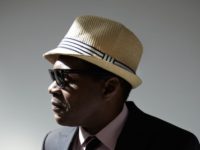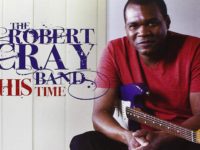Curtis Salgado, a former sideman with Robert Cray, Roomful of Blues and Santana, drops by to discuss a handful of key career moments. All along, he’s maintained a parallel and celebrated solo career, highlighted by his Alligator Records debut, Soul Shot.
Here, he goes in-depth on a signature influence in O.V. Wright, takes us inside the sessions that produced Cray’s debut recording — and then backstage with jump-blues legend Cab Calloway. Salgado also talks about working with Albert Collins, and the many influences that make up his unique brand of “rocking soul” …
“WHO’S BEEN TALKING,” with ROBERT CRAY (WHO’S BEEN TALKING, 1980): Salgado offers an insistent harmonica accompaniment on the title track to his old friend Cray’s debut album. Both men were coming off potentially career-making associations with Hollywood filmmaking, as Cray had a bit part in “Animal House” and Salgado served as an inspirational starting point for John Belushi’s Jake character in “The Blues Brothers.” Unfortunately, while it had all the makings — at least on paper — of becoming this showcase for a new blues supergroup, the album didn’t properly spotlight everyone’s strengths.
CURTIS SALGADO: I don’t know if it was a blues supergroup, though that’s an interesting concept. We weren’t super. Robert turned into a superstar, of course. But that’s a high compliment. I sang half a verse (on O.V. Wright’s “I’m Gonna Forget About You”), and played harmonica on it. The guy who produced the record, Bruce Bromberg, didn’t really let us stretch our wings. He didn’t really want the band, he just wanted Robert. Half of that first record is the band, and that was one of our first times ever in the studio. We had done a few demo-type things, but it was our first after signing a record deal. All of a sudden, we’re in Los Angeles. The very first song we played was “Who’s Been Talking.” That was the first take of the first time we played in that room. We ended the song, and there was a moment of silence, and then over the talk box came: ‘OK, that was good. Move along to the next one.’ We were, like: ‘What? We’re not going to do it again, try to make it better?’ We were expecting a couple of shots at this. But he just moved on to the next song. Then, he hired his own LA band, with some top sessions guys, and he brought them into the studio — and I thought he had Robert doing some of the most bozo stuff I ever heard Robert do. “I Must Have Been a Wino” was one of them. “I Must Have Been a Wino!” Then, years later, Bruce Bromberg called me up and apologized to me. He said: ‘I should have just made the whole record with the band.’ Here’s this band that’s been playing together for five years, bars and shitholes night after night, and he didn’t have the foresight to see that these guys were tight, and have a particular sound.
[SOMETHING ELSE! INTERVIEW: Curtis Salgado talks about career intersections with Robert Cray and John Belushi, and the enduring power of grease-popping, shotgun-shack rattling, ass-wagging soul music.]
“NOBODY BUT YOU,” (SOUL SHOT, 2012): This new cut from the O.V. Wright songbook, a highlight of Salgado’s just-released Alligator Records debut, is only the latest in a long line of tunes covered by Salgado, who counts the former Hi Records recording artist as one of his key influences. Salgado says his signature favorites from Wright include a 1971 take on “I Can’t Help It.” He referenced Wright on Robert Cray’s debut album, has regularly covered Wright’s 1965 tune “You’re Gonna Make Me Cry,” which went to No. 6 on the Billboard R&B charts; and included “I’d Rather Be (Blind, Crippled and Crazy)” on 2001’s Soul Activated.
CURTIS SALGADO: I spent some time with a bluesman by the name of Sonny Rhodes, and I brought one of his O.V. Wright’s records back to Eugene, Oregon. Robert Cray, Richard Cousins and I just ate it up. That was how we discovered O.V. Wright, and our hair rose. Sonny Rhodes knew exactly what I was after. Sonny, Little Frankie Lee and Buddy Ace were Oakland blues guys. I was going down there at the age of 20, and hanging out with Sonny Rhodes. Through that, I met another harmonica player named Gary Smith. There were a lot of real masters down there. Since, I’ve had an O.V. Wright song on just about every single solo CD that I’ve done. There’s just something about him.
“THREE CAN PLAY THAT GAME,” with ROOMFUL OF BLUES AND EARL KING (GLAZED, 1986): Salgado’s tenure with Roomful of Blues included some wild nights, and some notable collaborations. The hard-partying group – Salgado says “we used to have a joke that it was really Roomful of Booze” – recorded a Grammy-nominated album with New Orleans R&B legend Earl King (composer of “Come On,” later covered by Jimi Hendrix; and “Big Chief,” which became a theme song for Professor Longhair); while also backing up Big Joe Turner; and, perhaps most memorably for Salgado, Cab Calloway. Of course, all things must inevitably come to an end: Salgado says “after I left Roomful — well, after I was fired actually — I came home and got clean. I straightened up.” He has particularly fond memories of the evening spent with Calloway.
CURTIS SALGADO: One of the highest moments of my life: I did two shows with Cab Calloway. We did two shows, a matinee and then a late performance at the Savoy Ballroom, a place that used to be the swing jump joint of its era. I will never forget that. Here’s why: He couldn’t sing that well anymore, and he wasn’t a great singer in the first place — if you think in terms of singing like a Nat “King” Cole in the era that he came up. Cab Calloway created a whole thing, though, with his dance moves and his stage presence. He just came out there and he just opened up his chest. He didn’t care if his voice cracked. He did “St. James Infirmary,” “Minnie the Moocher.” The band was sharp as a tack. He was just so in control. Even though he was in his late 70s, it was all still there. His voice wasn’t perfect, but it didn’t matter to him. It was the confidence that he had in throwing it out there. A consummate performer. I was stunned. I remember thinking: ‘I can’t believe I’m in this room, in New York City, and there’s Cab Calloway.’ I wondered how many times he played that theater. He stayed after the show and, at the end of the night, it must have been two or three in the morning, and he was still signing autographs.
“LISTEN HERE,” ALBERT COLLINS (LIVE IN JAPAN, 1984): Typically played as the opening track to get the audience going, this became a concert favorite by Collins, for whom Salgado coined the nickname “Master of the Telecaster.” Salgado memorably backed up Collins at the 1977 San Francisco Blues Festival, helping secure a record deal for Collins with Alligator Records — where he would cut 1978’s seminal Ice Pickin’. Ironically, Salgado had earlier been turned down by label founder Bruce Iglauer: “He was too much of a purist, and said we were too slick,” Salgado says. “And now here I am on Alligator!” Working with Collins — famous for making treks out into the crowd, like the one above, thanks to a lengthy guitar cord — became the source of a number of unforgettable stories for Salgado.
CURTIS SALGADO: We’re in Eugene, Oregon, and this is the 1970s. We’re backing up Albert Collins, and he’s got the mile-long cord. He’d do this song called “Sex Machine” — not the James Brown song, but Sly Stone’s. We’re playing this damn song for 20 minutes! This is when he was just picking up bands, and we knew his songs, so it was great. But he did this song, and he walked out the door, into the street. We’re looking at each other, still playing. Over and over, the same little rhythm, and we’re looking down at his amp — and this shit is just coming out of it. (Salgado makes these weird gurgly feedback sounds.) Somebody came up to us, while we were playing, and said: ‘Albert has given his guitar to some hippie in the street.’ He switched instruments with him, and Albert started trying to play a flute! Meanwhile, we’re on stage suffering. (Laughs.) This guy doesn’t know how to play guitar! They’re out in the middle of the street. We can’t see what’s going on because he’s out the fucking front door. (Laughs.) Hilarious.
“BITTER TEARS,” with TERRY ROBB (HIT IT ’N QUIT IT, 1997): For a performer who has so often mixed and matched American musical styles, Salgado’s late-1990s collaboration with Terry Robb plays it surprisingly straight. Salgado and Robb, featured on an acoustic hollow-body guitar, perform a straight-forward set of tunes associated with Muddy Waters, Jimmy Rodgers, Little Walter and Elmore James, and they do it in a straight-forward manner – giving fans a chance to hear Salgado’s vocals and harmonica playing a raw, unvarnished setting. “Bitter Tears” was one of the album’s three originals — and a featured cut during the duo’s memorable performance on the David Letterman program.
CURTIS SALGADO: I’ve only made one solid blues record, Hit It ’n Quit It with Terry Robb. All of my records have been eclectic. There’s always blues on it, but also a soul ballad, lots of R&B. If I write a song, it’s going to be rock and roll — but the way I see it. You have to use other artists to describe it, but rock and roll like Little Richard or Fats Domino. What I play isn’t going to come out like that, though that’s a big influence. All of my stuff, if you go back, they’re not blues records — they’re rocking blues, they’re soul blues records. Solomon Burke calls his music ‘rocking soul’ and, if you’re going to stick me in a category, that’s kind of it. I always tell people this: I can’t stand categories. It’s just an omelet. Throw it all in, and you’ve got everything that makes up Americana — everything that makes up roots music.
- Nick DeRiso’s Best of 2015 (Rock + Pop): Death Cab for Cutie, Joe Jackson, Toto + Others - January 18, 2016
- Nick DeRiso’s Best of 2015 (Blues, Jazz + R&B): Boz Scaggs, Gavin Harrison, Alabama Shakes - January 10, 2016
- Nick DeRiso’s Best of 2015 (Reissues + Live): John Oates, Led Zeppelin, Yes, Faces + others - January 7, 2016




